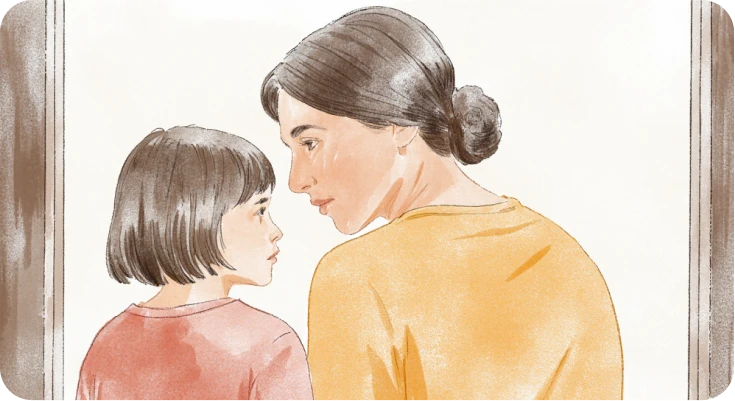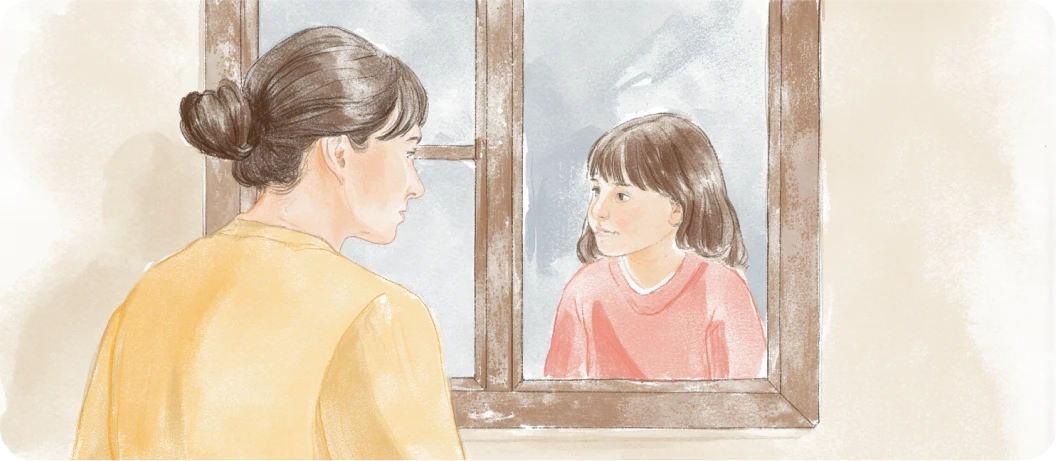Podcast name
Cold Mother Syndrome
You’ve never understood what you did wrong to deserve this distance. She has always been this way: cold and emotionally unavailable. Maybe she’s really busy or going through a hard time; you’ve spent so long trying to figure it out.
But eventually, there might be a big elephant in the room you can’t ignore any longer—cold mother syndrome. If that term resonates, this article will help you understand why. Learn the potential reasons behind an emotionally distant mother and the most common signs to recognize.
What Is Cold Mother Syndrome?
Cold mother syndrome, also known as emotionally absent mother syndrome, is a term that describes people who have grown up with a mother who is emotionally distant, unresponsive, and neglectful toward her child’s emotions and needs. Studies show that living in these conditions can even affect physical health, potentially leading to faster aging and a higher risk of diseases later in life. [1]
Cold mother syndrome is not an official medical diagnosis from DSM-5, but it’s a pattern of behavior that can deeply affect a child’s development, leading to their childhood trauma. According to clinicians and specialists, cold mother syndrome is considered a form of attachment trauma stemming from childhood and is also considered a type of mother wound.
Lindsay C. Gibson, a clinical psychologist, perfectly describes the cold mother syndrome in her book “Adult Children of Emotionally Immature Parents” with “Beth’s Story”:
Examples of “cold” mother behaviors
- She rarely showed affection or love. Instead of a warm hug after a fall, she gave a quick pat on the back and said that you’re okay. In your adult life, the idea of touching her seems strange or awkward.
- Problems processing her child’s emotions. When the child expresses sadness, she asks don’t be so sensitive, or there’s nothing to cry over.
- Being too critical. An emotionally distant mother might always point out her child’s messy room and remark, “You’ll never amount to anything if you can’t even keep your room clean.”
- Unpredictable or inconsistent behavior. A mother who is emotionally distant from her children may give them gifts one day but hardly acknowledge them the next day, leaving them feeling uncertain and confused.
- She blames others for her behavior. When her child worries that she doesn’t have enough emotional support, she tells them that they are “overreacting” and she “does so much for them.”
Do you feel emotionally neglected and disconnected from your own mother?
Cold Mother Syndrome Symptoms
Here are some of the most common cold mother syndrome signs:
- There was a sense that love and approval were conditional; you could only get them if you did well, behaved perfectly, or met her expectations.
- You were told to “toughen up,” “stop crying,” or feel weak or dramatic for expressing your emotions.
- You may have been left to “figure it out” on your own during hard times or felt ignored when you needed help.
- In your adult life, you may still be seeking approval from others or self-doubt about your worth.
- You may find it hard to trust people, lower your defenses, or feel seen if you are uncomfortable with intimacy.
- In relationships, you have a tendency to overfunction, attending to the needs of others while neglecting your own.
Do I Have Cold Mother Syndrome? Test Yourself
See if you’ve ever been a “cold mother” to yourself by taking this self-reflection test. It’s not a medical diagnosis, but it can help you figure out the patterns that led to the way you interact with others.
- I rarely felt emotionally safe to tell something important about myself.
- True
- False
2. The mother discouraged or punished you for expressing sadness, fear, or anger.
- True
- False
3. I don’t remember my mother being physically affectionate to me (e.g., hugs, soothing touch).
- True
- false
4. Compliments or praise from my mother were rare or tied only to my achievements.
- True
- False
5. I am not comfortable with intimacy or relying on others.
- True
- False
6. I constantly criticize myself and believe that I’m never “good enough.”
- True
- False
7. Most of the time, I over-perform to feel worthy and secure in my worthiness.
- True
- False
8. She didn’t seem genuinely interested in me, my thoughts, feelings, or dreams.
- True
- False
If you have more than four “True” answers, you may have had a cold or emotionally distant relationship with your mom.
What Causes a Mother to Be Emotionally Unavailable and Emotionally Absent?
Let’s explore some of the most common reasons for detached mother syndrome.
1. Unresolved trauma from childhood
A mother’s own childhood experiences can deeply impact her ability to nurture her children. For instance, a mother who has been raised with emotionally unavailable parents might unintentionally repeat these patterns with her children. If she had psychological trauma or emotional neglect, it might make it hard for her to form secure attachments. [2]
Also, this unresolved trauma from the past can show up as emotional distance and emotional unavailability, making it hard for her to show love and understanding and meet her child’s needs for support and love.
2. Mental health issues
Mental health conditions might be another reason for having a detached mother syndrome:
- Depression is common among emotionally unavailable parents. This mental health condition can significantly impact a mother’s mental health and her ability to bond well with her child. For example, a mother suffering from depression may find it difficult to engage in playful interactions with her child or to express love. It may leave her emotionally numb or disconnected, making it difficult for her to fully connect with her child, especially if the depression is severe or resistant to treatment.
- Anxiety might be another cause for emotionally absent parents. Having anxiety can lead to emotional disconnection and difficulty managing emotions, especially during panic attacks or amid intrusive thoughts, a study says. [3] A mother suffering from anxiety attacks may be unable to comfort her upset child, making the child feel neglected.
- Narcissism can also be a reason for emotionally distant parents since this condition can make it difficult to connect with others on a genuine level. A mother with narcissistic personality disorder might be so focused on her own needs and image that she overlooks her child’s emotional needs.
- Substance misuse can be a major contributing factor to absent parent syndrome. When a mother is struggling with substance use disorder, her addiction becomes her primary focus, overshadowing her ability to provide the emotional warmth and love that her child’s emotional needs require.
- The emotional instability usually associated with borderline personality disorder can make mothers seem distant or uncaring in one moment while loving and engaged the next. [4]
If you’re concerned that you may have BPD, take our “Do I Have BPD?” quiz.
3. Life stress
In many forms, loss and grief can make mothers emotionally unavailable and distant, which can lead to cold mother syndrome or cold father syndrome. A mother who is grieving the death of her partner or other relatives may also find it hard to connect emotionally with her child because her grief may drain her emotional energy. These experiences can create an emotional unavailability, hindering the mother’s ability to form a warm and nurturing bond with her child.
4. Mom burnout
When your mother has a difficult job, works excessively, or has strained relationships with others, she may quickly burn out, which can lead to cold mother syndrome and difficulty bonding with her children. A mother experiencing burnout, for example, may find it difficult to care for and support her child due to her own exhaustion. It’s important to remember that this behavior is unintentional and can be caused by the immense stress and fatigue that burnout brings.
5. Emotional immaturity
Children of emotionally immature mothers, due to her age, mental health issues, or other factors, may struggle to develop a healthy emotional foundation, which in the future may lead to emotionally unavailable mothering. The children of emotionally immature mothers grow up with their mother, but their behavior can make these children feel older than their mothers.

Cold Mother Syndrome Effects on the Child
According to research, the mother’s emotional unavailability interferes with a child’s developing ability to regulate emotions and behavior. This lack of consistent attunement affects physiological rhythms, play, sleep, and even immune function, with maternal depression having the longest-lasting effects. [5]
When parents are emotionally distant, it can affect how their kids grow up and see themselves. Many children raised in such environments develop an anxious-avoidant attachment style, a coping mechanism that teaches them to prioritize self-reliance over emotional connection.
It can also make a big difference in their self-esteem and how they connect with others. In different ways, this can be hard for both sons and daughters.
How an Emotionally Unavailable Mother Affects Sons’ Mental Health
Struggling with expressing emotions
You may find it hard to share your feelings, even with close friends. Ever feel like saying “I love you” is very hard for you? That’s very common for children with cold mothers.
Persistent feeling “not good enough”
Even when you succeed in your personal or professional life, a constant sense of not being good enough and low self-esteem can plague an adult son. An emotionally unavailable mother can make them constantly second-guess their abilities.
Anger issues
A mom with cold mother syndrome can cause years of unexpressed or suppressed emotions, which may lead to outbursts of anger or frustration over seemingly minor issues. This anger can also manifest in risky behaviors as they seek an outlet for their unresolved feelings.
Fear of intimacy
Getting close to someone can be downright terrifying for sons of emotionally unavailable moms. This kind of upbringing can cause their dismissive avoidant attachment style and fear of intimacy. They can distance themselves when things become serious or ruin relationships before they have a chance to grow.
Emotionally Absent Mothers’ Effect on Daughters’ Mental Health
The daughter’s experience with a neglectful mother may differ, but it is just as difficult. Here are the effects:
Constant self-blame
Childhood emotional neglect can cause a daughter to internalize her mother’s coldness, thinking, “If only I were a better daughter, my mother would love me.” She can carry the guilt and self-blame into adulthood.
People-pleasing tendencies
Having an emotionally absent mother and growing up without emotional support can lead to eldest daughter syndrome and parentification trauma. They might become overly concerned with meeting the needs of others. In a relationship, they may constantly apologize for minor inconveniences or put their partner’s needs ahead of their own.
Trust issues
It’s difficult to open up to others, fearing rejection or abandonment issues. A daughter of an emotionally cold mother may sabotage relationships because she subconsciously believes she does not deserve love. For example, she may reject a loving partner because of her insecurities.
Negative body image
A daughter of an emotionally distant mother might struggle with body image issues, constantly seeking external validation. They may become obsessed with her weight or appearance, believing she is not good enough as she is, which can lead to body dysmorphia.
Healing from an Emotionally Distant Mother
We all know we can’t change someone else’s thoughts or past experiences—those are theirs. And we can not “fix” cold mother syndrome since it’s part of us and part of our growth. We can not just erase it. But we can try to understand where it’s coming from and learn to be more self-compassionate about our experience.
With these tips, you might be able to overcome cold mother syndrome faster:
1. Accept what cannot be changed
Recognize that your emotionally distant mother may not be capable of providing the love and emotional support you need. Adjusting your expectations can help you avoid disappointment and resentment. While it’s natural to hope for your mother to change, it’s important to accept that she may not be capable of providing the emotional support you need.
Expert Insight
Growing up with cold mother syndrome can feel frightening, confusing, and depressing. If you blamed yourself or internalized her behavior, you’re not alone. You were simply trying to make sense of what happened to you. Moving forward, it’s important to remember that your mother’s parenting wasn’t your fault and that, no matter your relationship today, you can still heal.
Nicole Arzt
Mental health professional
2. Find alternative sources of nurturing
Try to shift your focus off your emotionally absent mother and build positive relationships with family, friends, or mentors who can offer emotional support. Consider joining a group or club to connect with others who share your interests.
3. Focus on your own happiness
Keep your happiness independent of your mother’s actions. Embrace and nurture your unique aspirations, passions, and connections. Interested in visiting Australia? On the other hand, you could sew Pusheen cats and sell them online. Try it out! Make your own path in life, without worrying about what your mom thinks.
4. Seek professional help and therapy
Helpful resources for gaining insight into the effects of cold mother syndrome, creating coping strategies, and establishing positive relationships include mental health specialists and family therapy. You can find a safe place to work through your emotions, grieve your unfulfilled needs, and create a plan for the future with the help of a therapist.
5. Try the Breeze app that helps alleviate cold parent syndrome signs
Curious about healing and understanding yourself better, and elevating signs of absent mother syndrome? We’ve put together a 28-day childhood trauma healing plan that might be just what you need. It’s all about gently working through past experiences so you can feel lighter and more at peace.
Sources:
- Knutsen, R., Filippov, V., Knutsen, S. F., Fraser, G. E., Lloren, J., Juma, D., & Duerksen-Hughes, P. (2019). Cold parenting is associated with cellular aging in offspring: A retrospective study. Biological psychology
- Lahousen, T., Unterrainer, H. F., & Kapfhammer, H. P. (2019). Psychobiology of Attachment and Trauma-Some General Remarks From a Clinical Perspective. Frontiers in psychiatry
- Tull MT, Gratz KL, Salters K, Roemer L. The role of experiential avoidance in posttraumatic stress symptoms and symptoms of depression, anxiety, and somatization. J Nerv Ment Dis. 2004
- Dixon-Gordon KL, Peters JR, Fertuck EA, Yen S. Emotional processes in borderline personality disorder: An update for clinical practice. J Psychother Integr.
- Field T. The effects of mother’s physical and emotional unavailability on emotion regulation. Monogr Soc Res Child Dev. 1994
Disclaimer
This article is for general informative and self-discovery purposes only. It should not replace expert guidance from professionals.
Any action you take in response to the information in this article, whether directly or indirectly, is solely your responsibility and is done at your own risk. Breeze content team and its mental health experts disclaim any liability, loss, or risk, personal, professional, or otherwise, which may result from the use and/or application of any content.
Always consult your doctor or other certified health practitioner with any medical questions or concerns
Breeze articles exclusively cite trusted sources, such as academic research institutions and medical associations, including research and studies from PubMed, ResearchGate, or similar databases. Examine our subject-matter editors and editorial process to see how we verify facts and maintain the accuracy, reliability, and trustworthiness of our material.
Was this article helpful?








